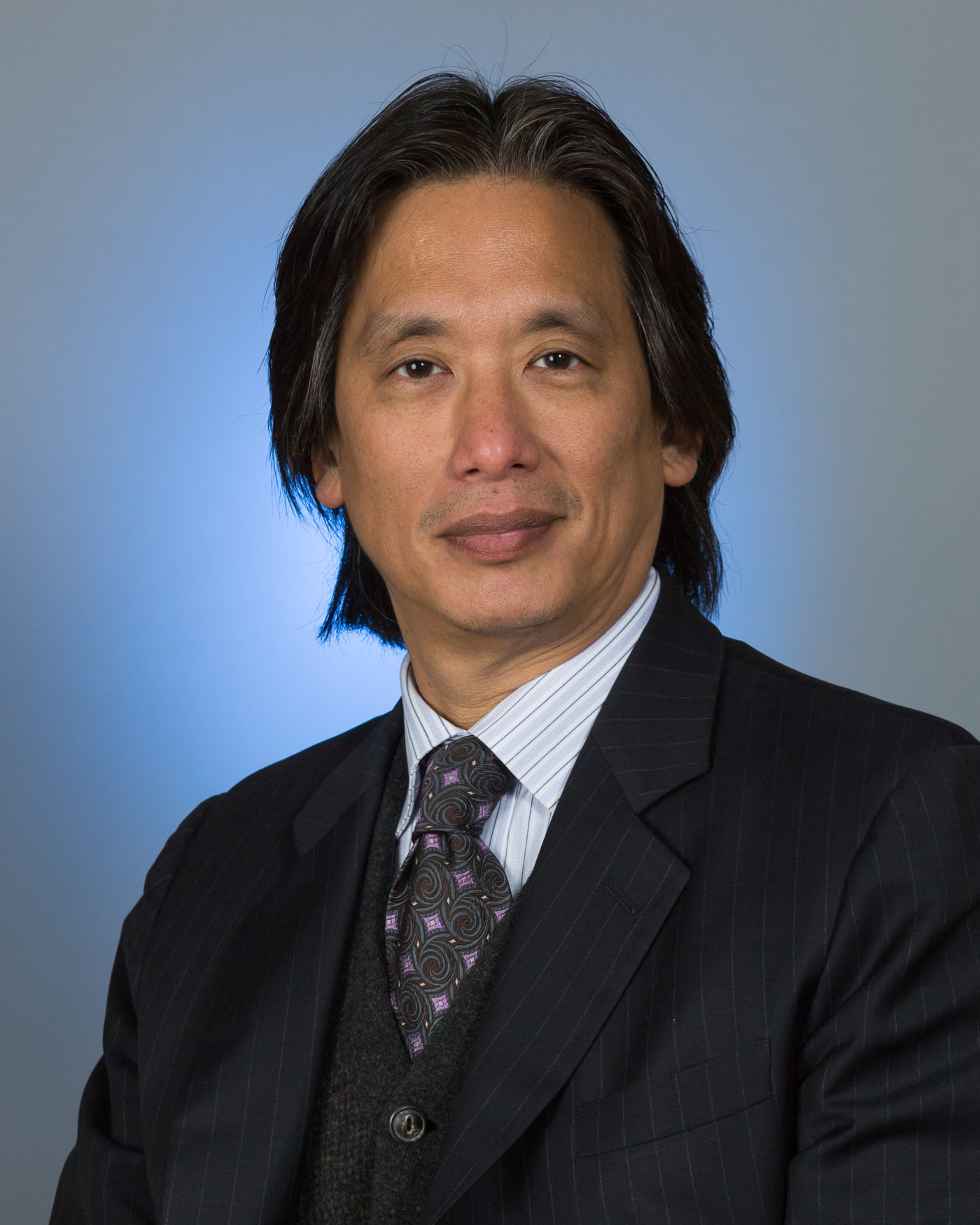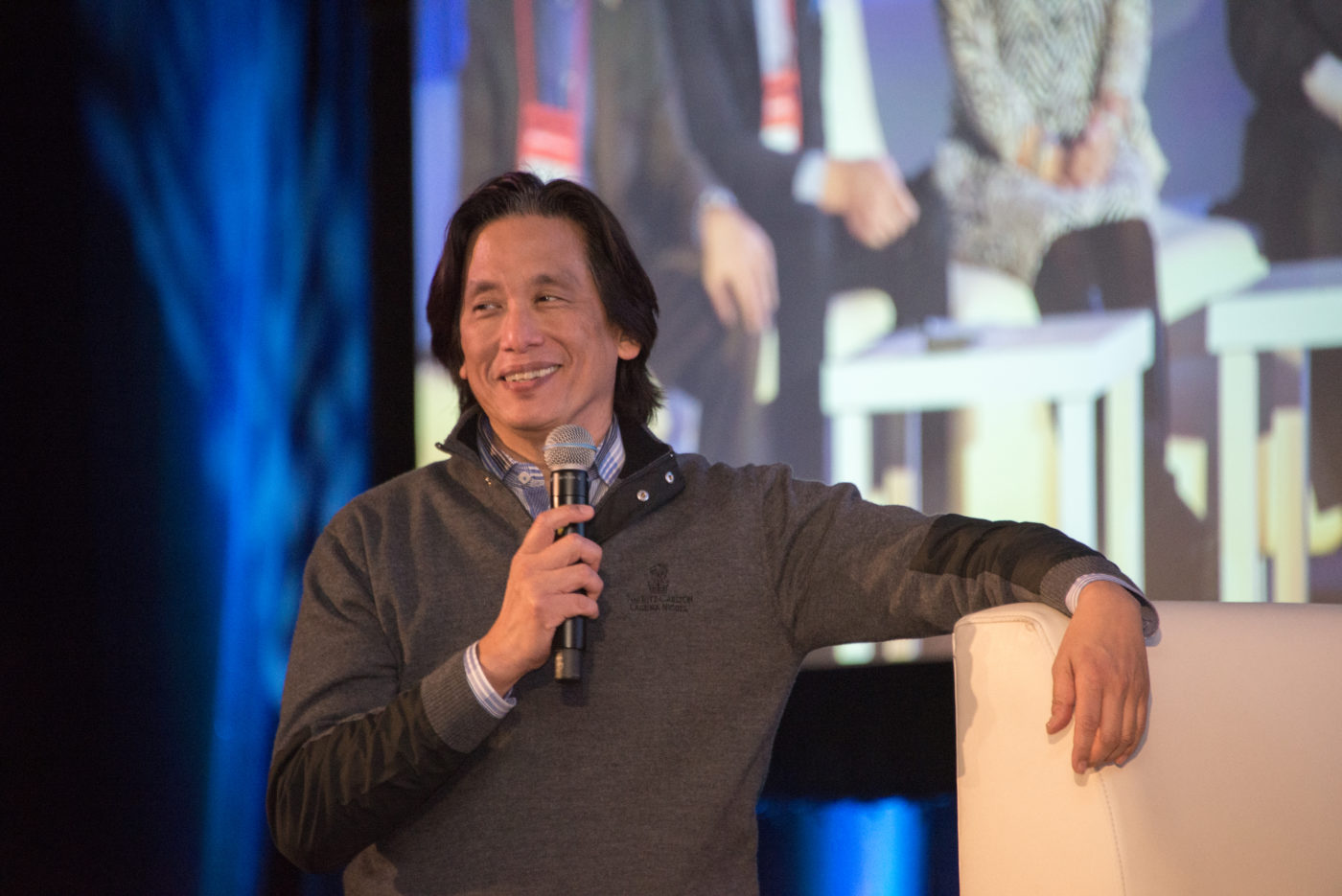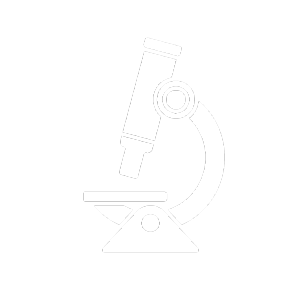Ever since he was a kid, Dr. Anthony Chang loved spies and espionage.
“If I didn’t become a pediatric cardiologist,” he says, “I would have seriously looked into becoming a secret agent.”
He loved the intellectual intrigue and mental challenges faced, and inevitably overcome, by fictional heroes James Bond and Sherlock Holmes.
Today, as chief intelligence and innovation officer at CHOC, Dr. Chang is devoting much of his brainpower to figuring out how to leverage artificial intelligence (AI) to improve healthcare – an effort that has seen him launch a staggering number and variety of initiatives that has put CHOC in the international spotlight as a pioneer in AI in medicine.

Unlike, say, the financial services industry, healthcare is way behind in employing AI tools to improve efficiencies and help doctors identify treatment options – among a host of other potential benefits.
That, however, is changing quickly. And Dr. Chang is at the forefront of what healthcare experts say is a paradigm shift.
“He’s a major mover and shaker in the area of AI in medicine,” says Dr. Bob Hoyt, a Florida-based physician and health informatics expert who connected with Dr. Chang shortly after Dr. Chang founded, in 2015, the Sharon Disney Lund Medical Intelligence Innovation Institute (Mi4), the first institution of its kind in a hospital.
“He’s big in AI in general, but he focuses on AI to make medicine better,” Dr. Hoyt says. “And his approach is international. It’s incredible the network he’s built up.”
Dr. Matt Lungren, a pediatric radiologist at Stanford Health Care and co-director of the Stanford Center for Artificial Intelligence in Medicine and Imaging, says it’s difficult to overstate the impact Dr. Chang and his team at Mi4 at CHOC is having in AI in medicine.
“There’s no doubt that his brilliance, generosity, and pioneering spirit has inspired countless careers,” Dr. Lungren says. “He is among the most important leaders for clinical AI today, and an evangelist for the potential that it can bring to patients all over the world.”
In 2015, after Dr. Chang spoke at an AI and medicine conference, the Chicago Tribune dubbed him “Dr. AI.”
He chuckles at the moniker.
“I’m not crazy about it, but many of my colleagues seem to think it fits,” he says.
Dr. Chang’s longish hair and charisma only help burnish his image as a rock star in the AI and medicine movement.
“I feel privileged to be a convener of so many great initiatives and minds,” Dr. Chang says. “I just want to do good.”
He’s quick to give credit to the entire team at Mi4 for CHOC’s leading role in AI in medicine, including neurologist Dr. Sharief Taraman, Chief Health Information Officer Dr. William Feaster, Chief Scientific Officer Dr. Terence Sanger, as well as Louis Ehwerhemuepha, PhD, manager of computational research at the CHOC Research Institute, and Senior Data Scientist Howard Lei, PhD, along with Mi4’s leadership team including Debra Beauregard and Tiffani Ghere.
“Anthony has proven to be a great supporter and advisor of our data science work at CHOC,” says Dr. Feaster. “By Dr. Chang working closely with our data science team, myself and our clinical staff, CHOC has become a leader in applying data science to medical care.”
Dr. Feaster said CHOC has pioneered the use of predictive analytic tools to reduce readmissions, predict sepsis and identify those patients at rising risk for healthcare utilization and the team has published many peer-reviewed articles on COVID and other medical topics.
International reach
Among his many endeavors, Dr. Chang is the founder and organizing chair of Artificial Intelligence in Medicine (AIMed), which gathers medical professionals from around the world for an annual summit.
Around 600 attendees came to AIMed’s last in-person event. The surge in the omicron variant of the coronavirus has postponed this year’s planned summit in late January to April or May.
“It’s pretty amazing to me that CHOC is getting all these centers from around the world, including the Mayo Clinic and Stanford and MIT, to convene,” Dr. Chang says. “I think they respect the fact that we were the first hospital to push for AI.”
Dr. Chang’s passion for AI stems, he says, from a lifelong love of mathematics.
“I’ve always been a computer and math nerd, going back to high school,” he says. “I was the only person in the chess, math, and computer clubs at my high school (Montgomery Blair in Silver Spring, Md.).”
Anything that has to do with numbers, Dr. Chang loves – which explains his decision to go into pediatric cardiology, a subspeciality of cardiology.
“It’s probably the most math-oriented subspecialty,” says Dr. Chang, whose father was an engineer and whose mother was a computer scientist.
“We measure things and make treatment decisions based on these measurements,” says Dr. Chang, who earned his medical degree at Georgetown University School of Medicine.
Three master’s degrees
Dr. Chang went on to earn three master’s degrees: one in public health from UCLA, one in healthcare administration from the University of Miami School of Business, and the third in biomedical data science from Stanford.
“Anthony is an inspiration to anyone who has a passion for learning and exploring,” Dr. Lungren says. “Even in the middle of a successful and brilliant career as a pediatric cardiologist, his excitement for learning and curiosity led him to pursue a biomedical data science master’s degree at Stanford, widely known as one of the most rigorous and challenging programs in the country.”
Dr. Chang also has completed a certification in artificial intelligence from MIT.
“He has since leveraged that knowledge, combined with his clinical experience, to help others curious about the power of data in clinical care forge their own careers,” Dr. Lungren says.
A key mentor
During his residency at Children’s Hospital of Philadelphia, Dr. Chang was mentored by legendary pediatric heart surgeon Dr. William “Bill” Norwood, Jr., who further nurtured his interest in math.
In a tribute after Dr. Norwood died on Dec. 13, 2020, Dr. Chang wrote: “I lost a very special teacher who not only taught me the wondrous complexities of congenital heart disease and surgery these past decades, but also enigmatic nuances and the unique magic of numbers in biomedicine.
“Dr. Norwood was a preeminent force in innovation who embodied the unrelenting drive to break the status quo and unparalleled courage to develop new strategies.”
Dr. Chang is known for several innovations in pediatric cardiac care and is the editor of several textbooks in pediatric cardiology. He also founded two societies that focus on cardiac intensive care for children.
Two more textbooks in the works
But AI, lately, has really pushed his buttons.
In February 2020, Dr. Chang published his first AI textbook, “Intelligence-Based Medicine: Principles and Applications of Artificial Intelligence in Clinical Medicine and Health Care.”
He’s well into a second textbook, “Intelligence-Based Cardiology.”

And he plans to write a third one: “Intelligence-Based Primary Care.”
These examples just scratch the surface of Dr. Chang’s AI-related endeavors.
“I suspect he only sleeps about four hours a night,” Dr. Hoyt says.
Other AI-related endeavors
Dr. Chang was the organizing chair for the biennial “Pediatrics2040: Emerging Trends and Future Innovations,” which CHOC/Mi4 founded, and which now is run by the International Society for Pediatric Innovation (iSPI). Dr. Chang organized iSPI to address the unmet need for an open global network focused on innovation leadership.
Dr. Chang also is the founder and director of Mi4’s Summer Internship Program, which mentors close to 100 young physicians-to-be every year. Dr. Hoyt has been a longstanding supporter of the Mi4 Summer Internship Program, along with several initiatives launched by Mi4 – including the Medical Intelligence Society (MIS).
Dr. Hoyt also has provided support for students to participate in the American Board of AI in Medicine (ABAIM), an AI education and certification course, and most recently provided scholarships to students to attend the AIMed Global Summit.
Dr. Chang also is editor in chief of the new journal, Intelligence Based Medicine.
He organized the Medical Intelligence Society and is its president.
He created the new American Board in Artificial Intelligence (ABAIM) in Medicine and its Board Review course, and last year he started teaching a new course at Chapman University on health information technology and innovation.
In 2021, Dr. Chang and Mi4, in collaboration with Stanford’s AIME Center, formed the Alliance of Centers of Artificial Intelligence in Medicine (ACAIM). Hosting the collaborative and educational efforts on AI centers, ACAIM includes more than 12 countries representing over 24 centers of excellence.
In addition to developing a white paper focused on AI in medicine, ACAIM also recently formed a sub-group of pediatric centers, convening as Pediatric Centers of AI in Medicine (PCAIM). ACAIM and the pediatric subgroup, PCAIM, will be convening virtually on a monthly basis during 2022, with plans for annual in-person meetings.
Where we’re at with AI
So where is CHOC and other hospitals at with AI?
Dr. Chang compares the stage to the era right after the Wright brothers’ first flight when biplanes ruled the sky. Those early airplanes, with two pairs of wings one above the other, are seldom seen anymore.
“I think the progress is going to be exponential,” he says of AI and medicine. “Things have definitely heated up in the last two years.”
Right now, AI tools primarily are being used in imaging to improve radiologists’ ability to make diagnoses. They also are big in cardiology. These tools are capable of reading X-rays, CT scans, and MRIs faster and more accurately than humans.
Routine EKGs now, with the help of AI, can predict stuff doctors never could in the past – even the age or gender of the person based solely on the EKG, Dr. Chang says.
The second big area where AI advances are being made is in the realm of natural language processing, the branch of artificial intelligence that helps computers understand, interpret and manipulate human language.
“Natural language processing basically takes free text, something you said, and makes numerical sense out of it,” Dr. Chang explains. “Companies like Google and Amazon have gotten into this big time, but we’re not where we need to be in medicine yet.”
It would be nice, for example, for doctors to be able to dictate charts and have AI interpret it and store it in some analytical way, he says.
About80 percent of medical records now are unstructured – meaning, the information doesn’t fit nicely into a database, Dr. Chang says. AI can help resolve that.
Last year, Google’s “AlphaFold” algorithm, using deep learning, accurately predicted 3D models of protein structures, Dr. Chang notes. This achievement could greatly increase the ability of drug companies to accelerate the development of therapies, he says.
Finally, AI is helping doctors gather data and make predictions off the patterns in the data.
Which kinds of patients are likely to readmit? Which kinds of patients are most likely to die with certain conditions like diabetes?
AI is helping doctors answer such questions.
Dr. Chang estimates that CHOC, and most other hospitals, is leveraging AI tools at only 5 percent to 10 percent of their potential capabilities.
“So,” he says, “we have 90 to 95 percent to go.”
Where AI in medicine is headed
As 2021 neared an end, Dr. Chang, in a newsletter, projected what’s ahead for AI in medicine.
The COVID-19 pandemic, he noted, has shaken up the healthcare system, “providing a grand opportunity for us to reshape the future of healthcare with artificial intelligence.”
He listed 10 potential areas for artificial intelligence to make a substantive impact in the coming decade:
- Extended reality converging with artificial intelligence. There is a surge in use of extended reality in healthcare but this is not yet coupled with artificial intelligence to render a “visual” experience into an “learning” experience with ambient intelligence for patients and caretakers.
- Artificial intelligence and real-world data with evidence generation. Artificial intelligence can help organize and collate real-world data from a myriad of sources to create evidence generation and render randomized controlled trials nearly obsolete.
- Wearable technology with embedded artificial intelligence. Hospitals will evolve into health systems so that the health of individuals will be much more monitored when they are away from the health system. Wearable devices will have primitive artificial intelligence capabilities.
- An artificial intelligence-enabled real-time continuous learning system. As health systems are hesitant to share data directly, federated and swarm learning that obviate the need to share data and only share models and parameters will become more routine for collaborations.
- Robotic process automation reducing administrative burden. Much of the high-cost administrative work can be executed by robotic process automation and the cost savings can be put back into the health system for other artificial intelligence-related projects.
- Cognitive analytics enabled with artificial intelligence. Most health systems are still performing analytics in the descriptive category with outdated software and the future hospital analytics will be performed with cognitive intelligence with deep reinforcement learning.
- Laboratory testing and imaging workflow and interpretation fully automated. The testing processes in the health system will be automated from beginning to end with results prioritized for intervention and will require human oversight only when necessary.
- Individual precision health with screening and virtual twins. The health system will be following individual health with a screening program (a health virtual twin) so that healthcare is entirely proactive to diagnose diseases such as cancer, heart disease, and diabetes.
- Regional population health with predictive modeling. The individual health virtual twins can be coupled to the entire cohort of the population to better predict healthcare interventions and outcomes in real time for the region.
- Natural language processing tools in healthcare. With the advent of transformer-type NLP tools, the portfolio of chatbots/virtual assistants can be more sophisticated and reduce the burden of common medical situations that can be safely redirected.
No robots
The term “AI” conjures up images of robots eventually replacing medical professionals.
Not so, Dr. Chang notes.
In fact, AI tools should lead to doctors spending more time with patients.
“With very intelligent use of artificial intelligence in medicine, it should be not visible, it should be omnipresent,” he says. “AI will be more like an invisible third party in the room that could mine and crunch data to help doctors identify treatment options.”
Dr. Hoyt says AI tools should make a difference in the so-called quadruple aim of medicine: Improve Outcomes, Reduce Costs, Improve the Experience of the Patient in Some Way, Improve the Life of the Physician/Health Care Team.
“AI needs to deliver in these four areas – otherwise it’s just a research tool, a toy,” Dr. Hoyt says.
Toys and gadgets abound in the world of James Bond. But they’re used to achieve some meaningful end.
So be it, Dr. Chang says, with AI and medicine.
The name “Mi4,” he notes, echoes the real-world UK domestic and foreign intelligence agencies, MI5 and MI6.
Mi4, which focused on the Germans, disbanded after World War II.
“So, I was able to use the name here at CHOC,” Dr. Chang says with a chuckle. “AI isn’t some fantasy. It’s happening now. At some time, medical textbooks will be rewritten. And I’m proud to say that CHOC was one of the first hospitals to embrace AI. We had the vision.”

Learn about pediatric research and clinical trials at CHOC




